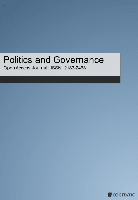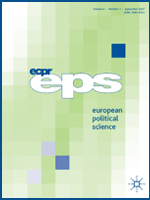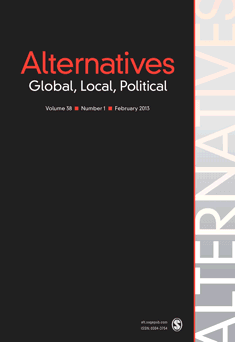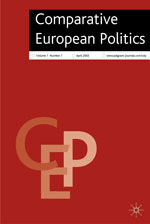
Politique Europeenne
Scope & Guideline
Shaping the Future of Political Studies in Europe
Introduction
Aims and Scopes
- Political Philosophy and European Studies:
The journal explores the contributions of political philosophy to understanding contemporary European issues, drawing from historical thinkers such as Hume, Kant, Voltaire, and Rousseau. - Digital Governance and Sovereignty:
A significant focus on the regulation of digital technologies, cybersecurity, and the implications of digital sovereignty for European states and institutions. - Democratic Processes and Governance:
Investigations into the nature of democracy within the EU, including issues surrounding populism, representation, and the rule of law. - Fiscal and Economic Policies:
Analysis of economic governance, fiscal capacity, and legal frameworks that shape the EU's economic policies in response to crises like COVID-19 and the war in Ukraine. - Social Policy and Integration:
Coverage of social issues, including gender equality, labor rights, and the intersectionality of social policies within the context of European integration. - Historical Perspectives on European Integration:
The journal features studies that examine the historical context of European integration, including the roles of various actors and the evolution of EU policies over time.
Trending and Emerging
- Digital Sovereignty and Regulation:
An emerging focus on how European states are navigating the challenges posed by digital technologies and the need for regulatory frameworks that ensure sovereignty in the digital realm. - Intersectionality in Social Policy:
Increased attention to intersectionality, particularly regarding gender and labor rights, highlighting the complexity of social policies as they relate to various marginalized groups within Europe. - Populism and Democratic Resilience:
A growing trend in analyzing populism's impact on democracy in Europe, exploring both the challenges it poses and potential pathways for enhancing democratic resilience. - Crisis Response and Governance Adaptation:
Research reflecting on how the EU adapts its governance structures and policies in response to crises, including health, economic, and geopolitical challenges, is increasingly prevalent. - Philosophical Foundations of European Identity:
Emerging interest in the philosophical underpinnings of European identity and integration, with discussions surrounding democracy, sovereignty, and the role of collective memory gaining traction.
Declining or Waning
- Brexit and Its Immediate Impacts:
The urgency surrounding Brexit discussions has diminished as the initial tumult subsides, leading to fewer papers focusing on the immediate implications of the UK's departure from the EU. - Traditional Nationalist Perspectives:
The emphasis on traditional nationalism, especially in the context of EU integration, has waned as more nuanced discussions around populism and transnational identities gain traction. - Historical Narratives of European Unity:
While historical analyses remain relevant, there is a noticeable reduction in papers that focus solely on the narratives of European unity, as current issues take precedence over retrospective studies.
Similar Journals

Politics and Governance
Empowering Voices in Public Administration and SociologyPolitics and Governance is an esteemed academic journal published by COGITATIO PRESS, focusing on critical discourse in the field of public administration, sociology, and political science. Since its inception in 2013, this open-access journal has established itself as a vital platform for innovative research and discourse, currently enjoying a commendable Q2 ranking in Public Administration and a prestigious Q1 ranking in Sociology and Political Science as of 2023. With an impressive Scopus ranking, placing it in the 86th and 74th percentiles for sociology and public administration respectively, Politics and Governance aims to disseminate quality scholarly articles that contribute to the understanding of political dynamics and governance structures. Through its commitment to open access, the journal ensures that valuable research is accessible to a global audience, fostering a diverse academic dialogue that is essential for evolving the field. Based in Lisbon, Portugal, the journal serves as a crucial resource for researchers, professionals, and students striving to engage meaningfully with contemporary issues in governance and policy.

European Security
Unraveling Security Challenges Across Europe and BeyondEuropean Security is a leading interdisciplinary journal published by ROUTLEDGE JOURNALS, TAYLOR & FRANCIS LTD, dedicated to advancing the understanding of security issues within the realms of Political Science and International Relations. With an impressive Impact Factor and a Q1 ranking in its field as of 2023, this journal has solidified its position as an influential platform for scholars and practitioners alike, ranking #93 out of 706 in the Scopus database. Since its inception in 1992, European Security has provided a forum for original research, analytical essays, and review articles that explore the complexities of security, conflict, and cooperation in the European context and beyond. The journal's commitment to high-quality scholarship is reflected in its rigorous peer-review process and the diverse perspectives it fosters. Although offering subscription-based access, the content within is invaluable for anyone engaged in the study of contemporary security challenges. Whether you are a researcher, professional, or student, European Security is essential reading for deepening your understanding of the dynamic and evolving landscape of international security.

Journal of Contemporary European Research
Advancing Knowledge on European DynamicsJournal of Contemporary European Research is a premier scholarly publication dedicated to the analysis and exploration of contemporary issues within European studies, publishing since 2005 under an Open Access model that promotes accessibility and dissemination of knowledge. Published by the University Association for Contemporary European Studies (UACES), this journal has established itself as a vital resource in the field of Political Science and International Relations, currently ranked in the Q2 category according to the latest evaluations in 2023. Based in the United Kingdom, its articles delve into diverse topics involving European policy, social dynamics, and international relations, contributing significant insights relevant to scholars, practitioners, and students alike. With a commendable Scopus ranking of #206 out of 706 in its category, it sits within the 70th percentile, reflecting its impact and importance in contemporary research discussions. The journal operates from the address of School of Public Policy, University College London, England, ensuring a robust influence from one of the leading academic institutions.

OSTEUROPA
Connecting Voices in Eastern European StudiesOSTEUROPA is a distinguished academic journal dedicated to the examination and analysis of social, cultural, and political developments in Eastern Europe. Published by BWV-BERLINER WISSENSCHAFTS-VERLAG GMBH, this journal has been a critical voice in the field since its inception in the mid-20th century, notably converging from various years to establish a comprehensive discourse on the dynamics shaping the region. With an ISSN of 0030-6428 and an E-ISSN of 2509-3444, OSTEUROPA taps into the expansive fields of sociology and political science, holding a reputable Q3 category ranking in these disciplines for 2023. While not currently an open access publication, it remains a vital platform for researchers, professionals, and students alike who seek to deepen their understanding of Eastern European affairs. The journal also ranks in the 17th percentile within the Scopus listings, underscoring its role as a significant, albeit niche, contributor to social studies and political science scholarship. Addressed from its base in vibrant Berlin, OSTEUROPA continues to foster intellectual dialogue and provide valuable insights into the complexities of Eastern European societies.

Populism
Unpacking the Forces Behind Populist PhenomenaPopulism, published by BRILL in the Netherlands, is an essential academic journal that delves into the complex phenomena surrounding populism in contemporary society. With an ISSN of 2588-8064 and E-ISSN 2588-8072, this journal has established itself as a significant resource for researchers and practitioners in Political Science and Sociology, earning a commendable Q2 ranking in both fields as of 2023. Covering a broad scope from theoretical frameworks to empirical analyses, the journal focuses on the implications of populism on political and social structures from 2018 to 2024. It positions itself as a vital platform for scholarly discussion, providing insights that contribute to the understanding of how populism affects global dynamics. Engaging with critical perspectives, the journal invites submissions that promote discourse and inquiry, making it an indispensable tool for academics and students seeking to explore the evolving landscape of populist movements and their societal impacts.

European Political Science
Exploring the Dynamics of European PoliticsEuropean Political Science, published by Palgrave Macmillan Ltd, is a leading journal in the field of political science and international relations, with a commendable impact factor demonstrated by its Q1 category quartile ranking in 2023. Established in 2005, this journal has become an essential platform for disseminating high-quality research and theoretical advancements within the discipline, supported by its significant presence in Scopus rankings where it stands at #106 out of 706 journals. Its distinctive aim is to contribute to the understanding of contemporary political processes, institutions, and ideas across Europe and beyond, while also addressing global issues that resonate with its diverse readership. Although it currently does not offer open access, researchers and practitioners will find valuable insights into critical political dynamics, making this journal an influential resource for students, academics, and policymakers alike.

Revista Internacional de Pensamiento Politico
Connecting Scholars, Inspiring ChangeRevista Internacional de Pensamiento Politico is a prestigious academic journal dedicated to the interdisciplinary exploration of political thought and theory, published by UNIV PABLO OLAVIDE in Seville, Spain. With its commitment to Open Access since 2006, the journal ensures that cutting-edge research is accessible to a global audience, fostering scholarly dialogue and innovation in the field of political science. Given the increasing relevance of political discourse in today's complex world, this journal serves as a vital platform for researchers, professionals, and students interested in contemporary and historical political ideas. While the journal is still building its H-index and Scopus ranking, it is rapidly gaining recognition for contributions that advance understanding of political dynamics, institutions, and ideologies. By bridging various theoretical approaches and engaging with diverse perspectives, Revista Internacional de Pensamiento Politico aims to enhance academic discourse and policy development in the realm of political studies.

Analele Universitatii Bucuresti-Stiinte Politice
Championing Open Access to Political ResearchAnalele Universitatii Bucuresti-Stiinte Politice is a prominent academic journal published by EDITURA UNIVERSITATII BUCURESTI, dedicated to the interdisciplinary fields of political science and sociology. With its foundation in 2014 as an Open Access journal, it facilitates unrestricted access to its articles, championing the dissemination of knowledge and research outputs within the scholarly community. Located in Romania, this journal provides a critical platform for researchers, professionals, and students to explore contemporary issues and theoretical advancements in political science and international relations. Although currently ranked in the fourth quartile in its categories according to Scopus for the year 2023, the journal represents a growing resource for emerging scholars aiming to contribute to these fields. The journal accepts submissions in various formats, enabling a multifaceted exploration of theories, methodologies, and case studies pertinent to current socio-political dynamics. With a commitment to fostering dialogue and collaboration among academics, Analele Universitatii Bucuresti-Stiinte Politice invites insightful contributions that advance understanding and provoke thought in the realms of political discourse.

ALTERNATIVES
Navigating the Complexities of Social Sciences with ExpertiseALTERNATIVES is a prominent academic journal published by SAGE Publications Inc, focusing on critical issues in Political Science and Sociology. Established in 1975, the journal has made significant contributions to the understanding of international relations and sociopolitical dynamics, boasting a commendable impact factor that places it in the Q2 category for both fields as of 2023. Its current Scopus rankings reflect its standing in the academic community, with a rank of 201/706 and a 71st percentile position in Political Science and International Relations, along with a 487/1466 rank and 66th percentile position in Sociology. ALTERNATIVES serves as a critical platform for scholars, researchers, and students alike, offering invaluable insights and access options to enhance discourse on contemporary sociopolitical issues. Its commitment to fostering innovative research and interdisciplinary dialogue makes it an essential resource for those engaged in the complexities of social sciences.

Comparative European Politics
Exploring the Dynamics of European GovernanceComparative European Politics is a leading academic journal dedicated to the nuanced exploration of political systems, policies, and behaviors across Europe. Published by Palgrave Macmillan Ltd, this esteemed journal has carved out a significant niche in the study of Political Science and International Relations, holding a prestigious Q1 ranking in its field as of 2023. The journal is recognized for its rigorous peer-reviewed articles that contribute to the advancement of knowledge and understanding in the discipline, making it an essential resource for scholars, practitioners, and students alike. With an impressive Scopus rank placing it in the 82nd percentile among its peers, Comparative European Politics provides a platform for innovative research and critical discussions, ultimately aiming to shape policymaking and theoretical frameworks across Europe. While currently not an open-access journal, it continues to offer various access options to ensure its findings are disseminated widely, further amplifying its impact on contemporary political discourse.